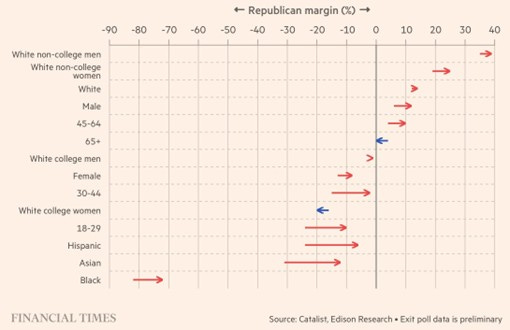The People Speak—But Who Listens?
Listening to the public was the deciding factor in last week's election, and the willingness to do so reflected the two parties’ present political philosophies.
Those who were surprised by the outcome of last Tuesday’s elections must not have been listening for the past four years. Listening to the public was the deciding factor in the election, and the willingness to do so reflected the two parties’ present political philosophies.
Going into this election year, the American people expressed concern about numerous issues, most prominently the economy, immigration, crime, and the government’s micromanagement of relations between the sexes. By Election Day, about 70 percent believed the country was headed in the wrong direction and 63 percent rated the U.S. economy “not so good” or “poor.” “About 8 in 10 voters wanted ‘substantial change’ in how the country is run, according to the AP survey,” the New York Post reported. Those numbers were in line with poll numbers for the past couple of years.
Vice President Kamala Harris and her campaign told the public not to worry about those things. Instead, they said we should be concerned about an imminent takeover by Nazi garbage people and a nefarious plot between Donald Trump and Project 2025 to prevent women from aborting their prospective children. Denigration of the Republican presidential and vice-presidential nominees’ personal character was the Harris campaign’s way of stoking those fears and identifying themselves as the solution.
Trump and his campaign had a simpler task before them, though the media made it much more difficult by continually laying traps for them. “Unburdened by what has been,” as Harris might say, because he was not in the White House and his opponent was, Trump could openly address the massive problems plaguing the great majority of the public. Trump and his team delighted in charging Biden, Harris, and the Democrat Party with causing a national decline, and he had plenty of examples from which to choose.
Since January 2021, the governing party had engaged in nearly four years of intensive centralization of political, economic, social, and cultural power, with the Biden-Harris administration at the center of it all. The media and other institutions eagerly assisted in this campaign. The government’s decision-making, in turn, was increasingly controlled by a small cadre of unidentified insiders, as exemplified by the bizarre process by which President Joe Biden was replaced as the Democrat presidential candidate after fairly and decisively winning the primaries and the nomination.
This consolidation of elites and the media-enforced protection from public pressure allowed those in power to avoid understanding or even feel any need to inquire into what life is like for ordinary Americans, if they happened to be curious about it. This cocoon of elitism led to a political campaign no better equipped to address the voters’ concerns than the Biden-Harris administration had done in its official actions. The party leaders’ and administration insiders’ distance from the people shut off its access to critical information about what the American public really wanted and cared about. Instead of addressing those concerns, the Biden-Harris government and Harris campaign team were encouraged to see only what the elites had decided the people should want.
Trump, out of power and not responsible for the nation’s current woes, was set free to do what he does best: go on offense. Trump gleefully hung the nation’s every problem and worry around the necks of the hapless Harris and her absurd running mate, the blundering Tim Walz. Trump continually contrasted the state of things today with how they were four years ago, when the economy was back on a positive trajectory with solid growth and low inflation after the fastest depression and recovery in history in the wake of government lockdowns based on a pandemic panic. Trump foregrounded the people’s worries and fears about inflation, immigration, crime, and other issues, addressing their concerns with expressions of sympathy and promises to “fix it.”
These two diametrically opposed campaign strategies reflected the two parties’ approaches to government. The party that represents aspiration toward omnipotent government and the omnipresent micromanagement of every action by anyone in the United States and, to the extent possible, the entire world, could not develop a plan for retaining the presidency and winning Congress other than to throw money at the problem. That paralleled the party's approach to governance, and it worked exactly as well.
The party that advocates private initiative, personal ambition, innovation, smaller government, crime prevention, peace through strength, and respect for family, faith, and America’s history and principles (however imperfectly and sporadically it may have represented these things over the years) campaigned with a looser approach. Trump indulged in jokes, insults toward powerful people, knowing hyperbole, improvisations, imaginative and amusing attention-getting stunts and statements, and a demeanor that consistently demonstrated engagement with his audience and affection for the public (probably surprising his critics with that). Running mate J. D. Vance emulated this approach in his own more subdued style.
Notably, Trump projected generosity through his willingness to step aside and let victims of Biden administration policies speak to his audience, though of course these were intended as political opportunities. Those testimonies and Trump’s byplay with audience members made for a stark contrast with the candidate’s unmistakable dislike of the people currently in power in the U.S. government, media, education system and other institutions.
With representatives of the last two presidential administrations on the ballot, the public chose to reject elitism and embrace populism. Trump “won the election thanks to White Supremacy (Latinos) and Disinformation (men),” Nellie Bowles cheekily wrote for The Free Press:
The whole country simply jolted to the right:
He moved every demographic rightward except rich white women (me, your narrator, your debutante, I’m the only one you people can’t blame). I’m also college educated, but you knew that (Columbia College Class of 2010, Comparative Literature and Society major, magna cum laude but it should have been summa, still looking into that).
It was decisive. It was across the board. Trump moved Hispanic voters right by 25 points. Young men have shifted nearly 30 points to the right since 2020. I didn’t even know they could shift that far, what with their gaming headsets plugged into their Xboxes.
Trump did it and he did it cheap: Kamala Harris raised three times as much money as Trump. Yes, all the people who tell us that money can buy elections are really quiet now because money didn’t buy this one. And folks tried! They brought the election to the register and they said, “Wrap it up real nice, please, it’s a gift.” The clerk said, “Ma’am this is a Wendy’s,” and “MAGA.”
The product Harris was selling was obviously defective, and her marketing scheme emphasized its weaknesses, every last one of them. The result was massive underperformance. The Wall Street Journal reports:
The political ground that Harris forfeited was expansive. Women as well as men shifted toward the Republican Party, compared with their preferences in 2020. Harris gave up a bit of her party’s advantage among college-educated voters while losing substantially among voters without a four-year degree, who account for almost 60% of the electorate. Black voters doubled their support for Trump to 16%, while Latino support grew by 6 points, to 41%. Harris also lost ground among voters with less than $100,000 in household income while making gains among the smaller group of voters who earn more than that amount.
With abortion as the only issue Harris felt safe talking about, she put all her attention on scaring women into the voting booths. It did not work at all. “[A] wider-than-ever gap between the sexes did not materialize,” Bowles notes in another article in The Free Press. “And we now know that the Republicans’ appeal to men was far more successful than the Democrats’ appeal to women.”
Importantly, female voters under age 30 moved toward Trump compared with their 2020 vote, with men of that age group moving even farther to the right. Harris lost 18 percentage points among voters aged 18-24 in comparison with Biden’s 2020 total, and among women in that age group the Democrat ticket’s advantage decreased by 14 percentage points. The economy proved to be far more important to young voters than anticipated. Predictably, leftist commentators are upset at them for that.
Bowles offers some additional statistics on the subject:
The Democrats’ vote share among women actually fell. Harris won 53 percent of female voters this year; Biden won 55 percent in 2020.
Trump, meanwhile, won 46 percent of women this year, up 3 percent from the last time he ran for president.
Trump made modest gains among men, winning 55 percent of them—2 percent more than when he ran in 2020—compared to Harris’s 42 percent.
But he did make insane gains among young men. Male voters under 30 went for Biden by a margin of 15 percent in 2020. This year, they went for Trump by a margin of 13 percent, a whopping 28-point swing.
Harris’s abortion-dominated campaign failed to entice young men to vote for her, Bowles notes:
So in the end, the gender gap between voters wasn’t as big as anticipated—except among young people (but only because young men moved more dramatically to the right than young women, who also shifted towards the Republican Party). Some Democrats have blamed their massive loss on the sexism of American voters. But, as Kat Rosenfield wrote yesterday, “to suggest that Americans balk at the notion of putting women in power is absurd.”
Trump, by contrast, moved to the center on abortion, knowing that his pro-life base voters would not defect to Harris, who was in fact extreme in her support for abortions up to the moment of birth and refusal to vote to require health care providers to provide care to children who survive termination attempts.
Instead of refighting the abortion war, Trump turned to a newer pro-woman issue. As Madeleine Kearns notes in another article in The Free Press,
Meanwhile, the Republicans adopted a pro-woman stance that resonated widely with the electorate: a ban on male transgender athletes participating in female sports. And they pushed a pro-parent policy, too: barring “gender-affirming care” for distressed minors.
For the past four years, the Biden-Harris administration has promoted a highly pro-trans agenda, starting with the embrace of “gender-affirming care” for minors with gender distress despite growing evidence these treatments are dangerous. They also overturned a Trump-era edict that only biological women can participate in women’s sports. And in April, Biden’s Department of Education broadened Title IX’s definition of sex-based discrimination to include “gender identity,” essentially requiring all schools receiving federal funds to admit biological males into women’s private spaces and sports teams.
What’s more, as a U.S. senator, Harris had her own baggage on the trans issue. In 2019, she promised taxpayer-funded sex-change surgeries for incarcerated illegal aliens. She supported the Equality Act, which would redefine sex in federal antidiscrimination law, requiring Americans to treat men identifying as women as women with the full protections of the law—from schools and shelters to hospitals and prisons.
The public strongly disagreed with Harris’s position on transgender policy, Kearns notes: “Polling shows that nearly 70 percent of Americans oppose males in women’s sports and sex-change procedures for minors.” Trump took full advantage of Harris’s vulnerability on the issue.
Other than approval of abortion and opposition to Adolph Hitler, Harris refused to tell the public what she really believes in. She sidestepped that central element of any political campaign because, of course, the public had repeatedly told pollsters that they hold opinions directly opposite hers on nearly everything—and that is with a large proportion of Republicans declining to answer the surveys.
Instead of running on the issues, the Harris campaign decided to run on money. Harris raised more than $1.2 billion in donations, more than three times as much as Trump’s $382 million. Both candidates also benefited from PAC support. The well-heeled Harris campaign spent an astonishing amount of money on depicting Trump as a Nazi and a danger to democracy. The Wall Street Journal reports:
The Harris campaign—her principal committee, associated fundraising committee and the Democratic National Committee—spent more than $654.6 million on ads from when she took over on July 22 through Election Day. During that period, Trump spent $378.9 million on advertising, according to the ad-tracking company AdImpact.
In the end, though, the Harris-Walz campaign was running on fumes. The progression of escalating personal attacks on Trump was all that the Harris people had available to them. Harris was not a Nazi, and that should be enough to get your vote, the campaign argued.
This effort, however, undermined Harris’s claims of being a staunch upholder of rule of law, given the personal destruction of Trump and his allies in which the Biden-Harris regime and political apparatus had engaged since taking office in 2021. A political movement that engages sympathetic media in censorship of embarrassing truths, deploys lawfare, attempts to bankrupt people, imprisons political opponents, tries to keep the other party’s candidate off state ballots, replaces its candidate without public input, and leaves an opposition presidential candidate vulnerable to multiple assassination attempts cannot plausibly offer its partisans as defenders of rule of law, “Our Democracy,” and the Constitution.
The lawfare had already backfired, in fact, bringing Trump new respect from underdog Americans when they saw his mugshot after one of his indictments. Those who deployed the deep state against their political opponents for the past four years and had done so throughout Trump’s first administration found it increasingly difficult to pretend their hands were clean. Instead, they ended up turning their opponent into a folk hero for many people.
The Biden-Harris zeal for destruction of political opponents at the expense of any visible concern for the people’s welfare was compounded by incompetence. Trump invited the public to consider the many disasters on the Biden-Harris watch, including but by no means limited to inflation, the border crisis, rampant crime, gender war, rising international tensions and the spending of U.S. taxpayer money on warfare abroad, the disastrous and fatally bungled retreat from Afghanistan, increasing antisemitism, forced acceptance of experimental mRNA injections, censorship, treatment of parents as terrorists, barbaric brutalization of trespassers into the American people’s Capitol building, and the replacement of the party’s lawfully chosen candidate by a flagrantly superficial, incurious, and unqualified successor chosen in secret by a small band of party insiders and intimately connected to all the disasters the government had inflicted on the American people in the past four years.
Harris’s failure in characterizing Trump as unqualified to be president was inevitable and entirely predictable. The issue highlighted the regime’s central fault—its elitism—and provided support for Trump’s claims to be the people’s champion.
The same was true of the media’s emphasis on Harris’s skin color and second X chromosome. These celebrations of diversity invited suspicion that Harris’s qualifications for the presidency were not based on any relevant abilities but instead her checkmarks on diversity, equity, and inclusion tests, which Biden had promised to do in picking a vice-president. Young males of any ethnicity were far less impressed by these alleged qualifications than the media apparently expected them to be.
In addition, swaddling Harris in bubble wrap left her unprepared for the bare-knuckle scrap Trump carried out with evident glee. “As the Harris campaign begins to point fingers, it could do worse than to direct a digit at its buddies in the Fourth Estate,” opined Kimberly A. Strassel of The Wall Street Journal editorial board after the election. “Never in modern history has a media complex shilled so openly for one candidate. Yet all that did was allow the Harris campaign and elites to live in a bubble, while further eroding confidence in the media.”
Compounding that problem, celebrations of Harris’s sex and ethnicity invited attention to her thin political resumé and political radicalism. The media regularly promotes stocking political power centers with people who supposedly “look like America” instead of ones who think like America. Expecting people to vote for politicians who value appearance over competence and loyalty to the nation’s founding principles is another obvious sign of elitism.
In the end, the destruction of the regime’s hopes and dreams proceeded directly and inexorably from its own inattention to and evident indifference to the clearly and repeatedly stated desires of the American people. The latter were and are honorable and achievable goals such as economic growth, staying out of foreign wars, safety in our houses and in public, low-cost energy produced domestically to the extent possible, a clean environment without fanatical destruction of the economy, protection of our God-given freedoms and/or natural rights, respect for family and faith, and a government that acts fairly and promotes the general welfare without engaging in social engineering, an enormous political spoils system, and a forced, nationwide demographic transformation.
It is difficult to conceive of a more absurd and ill-suited response to the chaos of the past four years and the Biden-Harris administration’s obvious responsibility for it all than for the regime’s chosen candidate to say that “there is not a thing that comes to mind” as to what she might have done differently. That moment laid bare decades of escalating incompetence and indifference toward the American people. The regime’s obvious failure to recognize and sympathize with other people’s suffering explains why Donald Trump is president again.






